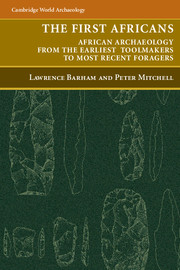Book contents
- Frontmatter
- Contents
- List of Figures and Tables
- Acknowledgements
- THE FIRST AFRICANS
- 1 Introducing the African Record
- 2 Frameworks in Space and Time
- 3 First Tool-Users and -Makers
- 4 Early Pleistocene Technologies and Societies
- 5 Mid-Pleistocene Foragers
- 6 Transitions and Origins
- 7 The Big Dry: The Archaeology of Marine Isotope Stages 4–2
- 8 Transitions: From the Pleistocene into the Holocene
- 9 Hunting, Gathering, Intensifying: The Mid-Holocene Record
- 10 Foragers in a World of Farmers
- 11 The Future of the First Africans' Past
- Notes
- Glossary
- References
- Index
1 - Introducing the African Record
Published online by Cambridge University Press: 05 June 2012
- Frontmatter
- Contents
- List of Figures and Tables
- Acknowledgements
- THE FIRST AFRICANS
- 1 Introducing the African Record
- 2 Frameworks in Space and Time
- 3 First Tool-Users and -Makers
- 4 Early Pleistocene Technologies and Societies
- 5 Mid-Pleistocene Foragers
- 6 Transitions and Origins
- 7 The Big Dry: The Archaeology of Marine Isotope Stages 4–2
- 8 Transitions: From the Pleistocene into the Holocene
- 9 Hunting, Gathering, Intensifying: The Mid-Holocene Record
- 10 Foragers in a World of Farmers
- 11 The Future of the First Africans' Past
- Notes
- Glossary
- References
- Index
Summary
Humans have inhabited Africa longer than anywhere else on Earth (see inset). Their history there reaches back beyond the oldest known stone tools to the point, 6 million to 7 million years ago (mya), when the evolutionary lineage that ultimately produced Homo sapiens finally diverged from that leading to other hominids. Investigating the human past in Africa is thus crucial to developing an understanding of our origins and history as a species, to answering the question, ‘What makes (and made) us human’? Responding to this challenge, archaeologists have learned that Africa was not once, but three times, humanity's continent of origin: first, as members of the hominin lineage itself; second, as members of the genus Homo, which emerged around 2 mya; and most recently with the evolution of anatomically modern humans and their subsequent expansion beyond Africa within the past 100,000 years.
Moreover, an emerging body of evidence indicates that distinctively modern forms of behaviour, specifically the constitution of individual and community life through the use of material objects charged with symbolism and socially ascribed meanings, also have their roots in Africa. Darwin's (1871:161) guarded prediction that ‘it is somewhat more probable that our early progenitors lived on the African continent than elsewhere’ has been more than borne out by events.
- Type
- Chapter
- Information
- The First AfricansAfrican Archaeology from the Earliest Toolmakers to Most Recent Foragers, pp. 1 - 28Publisher: Cambridge University PressPrint publication year: 2008



